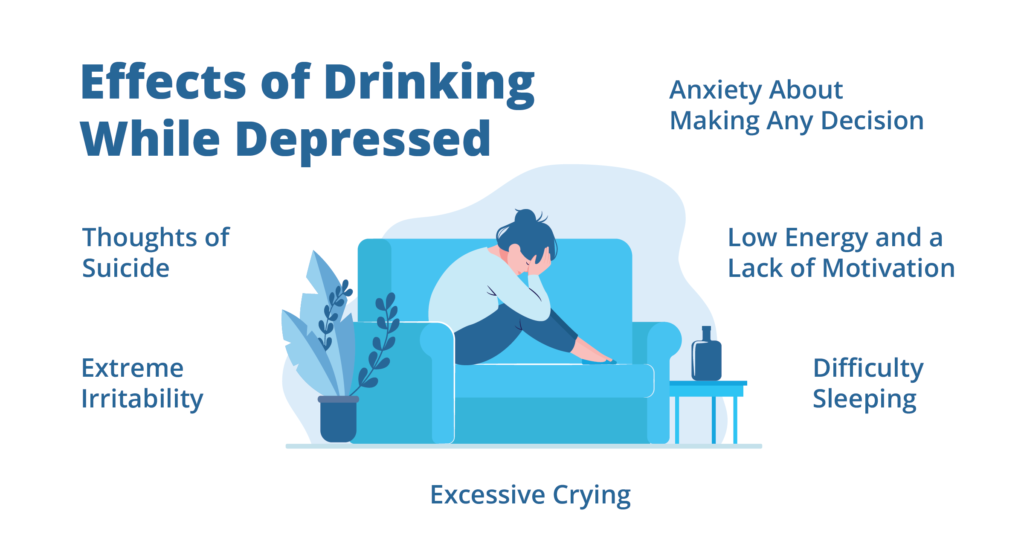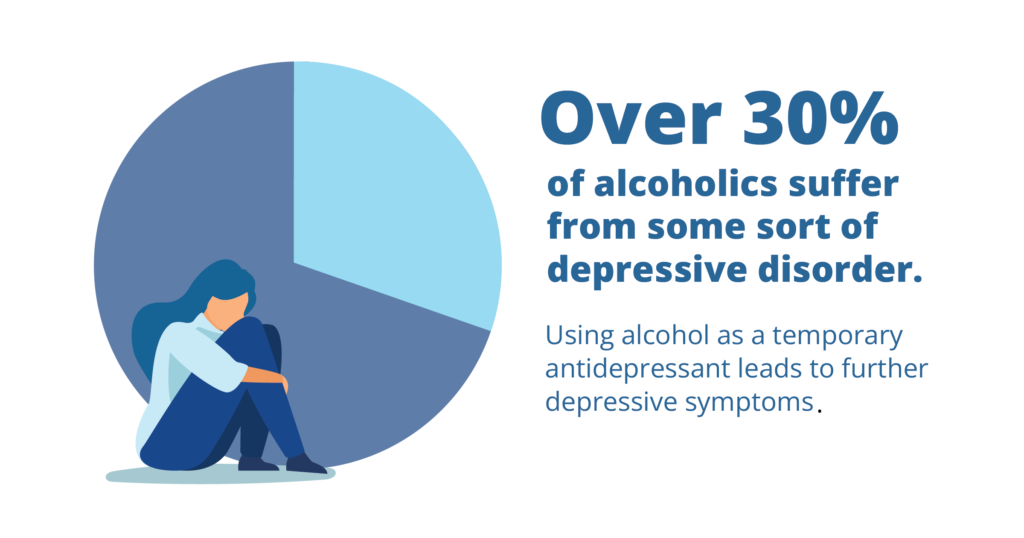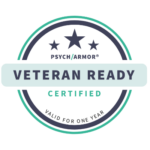Alcohol abuse and depression often go hand in hand, as having one typically increases the chances of developing the other. Alcohol makes symptoms of mood disorders worse, and depression can cause an individual to drastically increase their alcohol consumption. Luckily, there are plenty of effective treatments for co-occurring conditions like alcohol use disorder (AUD) and depression.
Understanding Depression
It is completely normal for a person to experience feelings of sadness and lack of energy every so often in their daily life. Clinical depression disorders are far more severe than sadness caused by day-to-day stress, they are serious mental health conditions that can disrupt a person’s ability to function. Major depression is a mental illness can affect how a person thinks, feels and handles daily tasks like showering, eating, working, or exercising. Over 264 million individuals are impacted by depression worldwide.

Common Types of Depression
There are many types of depressive disorders, some more serious than others. Below are a few of the most common types of depression disorders.
Major Depression
Major depression is the most serious type of depression, as these negative moods and overwhelming feelings start to interfere with an individual’s daily life.
Common signs of major depressive disorder can include:
- Extreme irritability
- Low energy and a lack of motivation
- Excessive crying
- Thoughts of suicide
Seasonal Affective Disorder
This is a type of depression commonly referred to as the “winter blues” and is linked to the shifting of seasons and changes in light that it causes. Symptoms of this mental illness typically appear around the fall when days are shorter and can slowly progress throughout the winter. These low, negative emotions often improve as spring and summer approach and days are longer again. Symptoms of seasonal affective disorder must be present for at least two consecutive years for a formal diagnosis.
Symptoms of seasonal affective disorder include:
- Oversleeping often
- Gaining or losing more weight than is usual for you
- Feeling sad or irritable on most days
- Loss of hunger or binge-eating
Psychotic Depression
Psychotic depression is a more severe disorder that can involve hallucinations and paranoia, causing a person to hear voices or believe that someone or something is out to get them.
A few common signs of psychotic depression include:
- Sleeping all day then struggling to sleep at night
- Drastic mood swings
- Neglecting self-care or hygiene
Persistent Depressive Disorder
People that suffer from persistent depressive disorder experience recurring depressive symptoms that last for at least 2 consecutive years. Symptoms can vary significantly, some days or weeks being more severe than others.
Common signs of a persistent depressive disorder include:
- Feelings of insecurity and worthlessness
- Difficulty sleeping
- Anxiety about making any decision
- Difficulty staying focused on anything
The Connection Between Alcohol Abuse and Depression
There is an incredibly strong link between habits of heavy alcohol use and depression. For people diagnosed with a depression disorder, alcohol is often used as a way to self-medicate and ease or prevent symptoms like anxiety, irritability, and insomnia. However, creating an unhealthy alcohol dependence can cause an increased risk of significant long term effects on a person’s physical and emotional well-being.
Alcoholism can worsen mental health issues by throwing off serotonin and dopamine levels in the brain. Combining alcohol with prescription medications like Zoloft or Abilify can lead to negative effects like headaches and respiratory distress. Without treatment, this co-occurring disorder can become a dangerous never-ending cycle, increasing the risk of severe health problems, suicidal thoughts, and bodily injury.

Diagnosing Depression and Alcohol Abuse
Your doctor may perform a lab test, physical exam, and psychological evaluation to access any symptoms from either condition. These tests can determine what kind of depressive disorder you have, as well as check for any other health conditions. The Diagnostic and Statistical Manual of Mental Disorders is typically used by doctors and other health professionals to form a diagnosis.
Alcohol and Depression Treatment Options
- Detoxing: Typically the first step in the recovery process and is a safe and comfortable way to quit drinking.
- Medication: Patients who struggle with substance abuse and depression are often given antidepressants that can be used for the treatment of depression. Along with anti-depressants, a patient may also receive naltrexone, which reduces symptoms of depression and disulfiram which is commonly used as an alcohol deterrent.
- Behavioral therapy: There are a few different types of behavioral therapies. Cognitive-behavioral therapy teaches patients positive coping mechanisms to replace thoughts and patterns that can worsen alcoholism or depression disorder. Behavioral Activation is another form of behavioral therapy that involves understanding how certain life experiences and behaviors can influence your emotions and motives patients to take an active approach to life. Mutual support groups like Alcoholics Anonymous (AA) are an effective way to cope with AUD and depression by receiving support from peers. Most behavioral therapies can be done one-on-one or in the form of group therapy.
Frequently Asked Questions
Which antidepressants are best for alcoholics?
According to research, antidepressants nefazodone, desipramine, and imipramine have the most robust effects on decreasing depressive symptoms that come from the dual diagnosis. These serotonin modulators are often used in conjunction with psychosocial therapies that can motivate a patient towards recovery and lasting sobriety. These types of medicines work by increasing the amounts of natural substances in the brain necessary for maintaining a healthy mental balance.
How do you get rid of alcohol-induced depression?
Alcohol misuse can often lead to periods of severe depression, far worse than your average hangover. If you are experiencing an alcohol induced depression like this, there are a few things you can try to get back on track:
Start by drinking lots of water to rehydrate your body.
Take a walk outside to get some fresh air and clear your head.
Spend time with a loved one or do something you enjoy like gardening or cooking.
Even just 10-20 minutes of this productive relaxation can help counter depressive symptoms induced by alcohol consumpt
How long does alcohol induced depression last?
The duration of alcohol induced depression can drastically vary from person to person. These depressive symptoms can significantly improve after a person has not consumed alcohol for a certain time period. Typically, depression brought on by alcohol can last anywhere from 3-4 weeks.
However, if symptoms continue to progress, these low periods after heavy drinking can quickly turn into an independent depression disorder. If not properly treated, an individual can enter a dangerous cycle of self-medicating with alcohol, worsening symptoms significantly over time and creating long-term mental and physical effects.
Do alcoholics suffer from depression?
Over 30% of alcoholics also suffer from some sort of depressive disorder. It is common for an individual to develop a substance use disorder from trying to use alcohol as an antidepressant, subsiding the symptoms of depression for a small period of time. Once this person is sober again, these low moods and negative thoughts can be all consuming, getting progressively worse every time they are drunk. This is often what begins a damaging cycle of binge-drinking to self-medicate common symptoms of depression.
The Haven Can Help
If you or a loved one struggles with co-occurring AUD and depression, The Haven can help. Our treatment facility offers drug and alcohol detox treatments and residential rehab programs in South Florida. For first responders struggling with addiction, our treatment center offers treatment programs that can help. When you are ready to take this first step towards sobriety, contact us at (561) 328-8627. For more information, check out our blog for more treatment resources.






